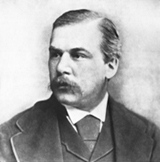For decades, John Pierpont Morgan personified the capitalistic system. The Stock Exchange, banking, the companies, the banks themselves, the American currency... all of these were his to have.
He even kind of resembled Moloch, with his big head, strong features, ice-cold eyes, thunder-like voice and robust torso. He filled people with fear. And yet he was a melancholic, depressive man. Perhaps it was the burden of his own power.
This is his story.

He was born on April 17, 1837. 35 years later, he was richer than his own Government. He backed an inventor called Thomas Edison and created the Edison General Electric Company, later to be known as General Electric. In 1901 he spent $480 million (just to be clear: at the time, all the money that the Federal Government had amounted to $300 million) in buying the Carnegie Steel Company and merged it with his Federal Steel company he created U.S. Steel, the biggest company in the world.
In 1907, Wall Street crashed again and Morgan elevated himself to a kind of central bank persona (the Federal Reserve didn't exist yet), berated bankers, threw 20 of his millions to the U.S. economy and everything got a little bit quieter. All of this within 10 minutes.
He was among the founders of the Metropolitan Museum, the American Museum of Natural History and the New York Botanical Gardens.
His spirit lies in one of the most recommendable spots in Manhattan: The Morgan Library. Contrary to many beliefs, Morgan never lived in the building on 36th street. He would seclude himself in it on his depressive days. Just like Frick, he cleaned his conscience through collecting art. And he was remarkably intelligent. He coined such fantastic aphorisms like
"If you have to ask how much it costs, you can't afford it."
"Go as far as you can see; when you get there, you'll be able to see farther."
"A man always has two reasons for doing anything: a good reason and the real reason."
And then there's a final and special one:
"No problem can be solved until it is reduced to some simple form. The changing of a vague difficulty into a specific, concrete form is a very essential element in thinking."
President Roosevelt made a political career out of publicly accusing him of creating a monopoly and then privately asking him for money. Morgan, who had supported Vanderbilt's railway empire following instructions from Abraham Lincoln, consented this.
He died in Rome in 1913. He had no time to clean up the mess that the banks made in 1929.